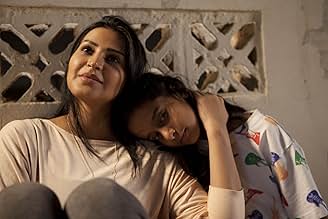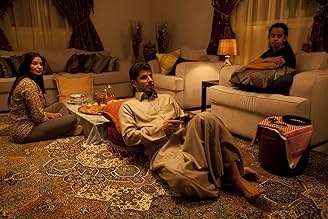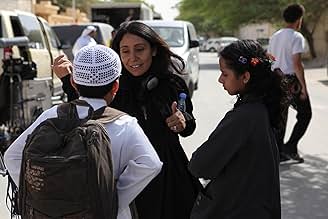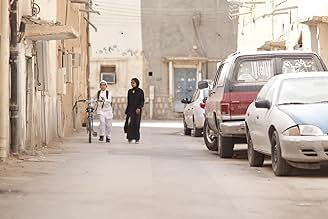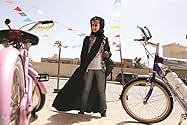CALIFICACIÓN DE IMDb
7.5/10
22 k
TU CALIFICACIÓN
Una niña saudita emprendedora se inscribe en la competencia de recitación del Corán de su escuela como una forma de recaudar los fondos faltantes que necesita para comprar la bicicleta verde... Leer todoUna niña saudita emprendedora se inscribe en la competencia de recitación del Corán de su escuela como una forma de recaudar los fondos faltantes que necesita para comprar la bicicleta verde que ha captado su interés.Una niña saudita emprendedora se inscribe en la competencia de recitación del Corán de su escuela como una forma de recaudar los fondos faltantes que necesita para comprar la bicicleta verde que ha captado su interés.
- Dirección
- Guionista
- Elenco
- Nominada a1 premio BAFTA
- 22 premios ganados y 36 nominaciones en total
Abdullrahman Al Gohani
- Abdullah
- (as Abdullrahman Algohani)
Sara Al Jaber
- Leila
- (as Sara Aljaber)
- Dirección
- Guionista
- Todo el elenco y el equipo
- Producción, taquilla y más en IMDbPro
Opiniones destacadas
It is quite hard to come to Wadjda with a clear head and I suspect with the awards season coming up, it will be harder to do so in the future, which is why I wanted to watch it now. Part of the reason for this is that the film has had quite a bit of publicity due to its place in history, it being the first film in Saudi Arabia directed by a woman and this made me think that perhaps critics would have been quick to be generous to it. For sure I think this is a factor and the context of it representing (in theory) a country moving towards ever so slightly less hard-line conservatism may also be a factor in awards voting; but my concern was that this mean weaknesses were forgiven and stronger aspects were hyped up. The second thing in my mind was that perhaps Wadja would be very critical of Saudi as it may be seen as "time to settle some scores" and that this would be less a film and more a finger wagging exercise.
The reality is that neither of these are really the case and indeed the main strength of Wadjda is that it is simply a coming-of-age story which is set in Saudi Arabia. This means that the film doesn't push an agenda in a very heavy handed and frequent way, but rather just uses the culture of its setting as part of its story, just like any other such film would do in the context of their country. I liked this a lot because very quickly I was able to settle in and just enjoy the film for its character and story. And it helps that the story is engaging, warm and quite cheering in some ways; Wadjda is a sweet heart to the film and is very well played indeed by Waad Mohammed and she plays very well with her simple goal of just wanting to be herself and not be restricted by others – again a theme that maybe has more significant in her context, but still one common to these types of films. The film plays his out well with other threads and challenges to others around her which resonate with the impact of restrictions but again not in a heavy-handed or really obvious way.
It is a fine line to walk but the film does manage to flag issues for discussion but not to do so in a way that is overly critical or unrealistic even if it is progressive; perhaps to use the right language it is a very subdued and modest criticism and it is never front and centre on the screen. The balance means that it will engage you with the simple structure of its story while also making its points with things shown to inform and characters within the story used to illustrate different aspects of choices to be made – whether it be Wadjda's refusal to be restrained or Ms Hussa's overcompensation for not doing the same herself. It is very well shot and directed – and not "considering the circumstances", but rather it just is. The use of locations is really good, giving the film a strong sense of play and I do hope someday there is a "making of" documentary as I think the daily reality of making this must itself be an interesting story.
Wadjda is a very good film even if I think a lot of the hype and gushing that will come during the awards season is as much about the context as it is about the film itself – although this is not a bad thing by any means. The makers walk a fine line really well – not making direct criticisms so much as telling an engaging and warm story out of which comes the obvious criticisms and discussions which could be had. It does this very well and deserves to be seen as a film as well as a statement.
The reality is that neither of these are really the case and indeed the main strength of Wadjda is that it is simply a coming-of-age story which is set in Saudi Arabia. This means that the film doesn't push an agenda in a very heavy handed and frequent way, but rather just uses the culture of its setting as part of its story, just like any other such film would do in the context of their country. I liked this a lot because very quickly I was able to settle in and just enjoy the film for its character and story. And it helps that the story is engaging, warm and quite cheering in some ways; Wadjda is a sweet heart to the film and is very well played indeed by Waad Mohammed and she plays very well with her simple goal of just wanting to be herself and not be restricted by others – again a theme that maybe has more significant in her context, but still one common to these types of films. The film plays his out well with other threads and challenges to others around her which resonate with the impact of restrictions but again not in a heavy-handed or really obvious way.
It is a fine line to walk but the film does manage to flag issues for discussion but not to do so in a way that is overly critical or unrealistic even if it is progressive; perhaps to use the right language it is a very subdued and modest criticism and it is never front and centre on the screen. The balance means that it will engage you with the simple structure of its story while also making its points with things shown to inform and characters within the story used to illustrate different aspects of choices to be made – whether it be Wadjda's refusal to be restrained or Ms Hussa's overcompensation for not doing the same herself. It is very well shot and directed – and not "considering the circumstances", but rather it just is. The use of locations is really good, giving the film a strong sense of play and I do hope someday there is a "making of" documentary as I think the daily reality of making this must itself be an interesting story.
Wadjda is a very good film even if I think a lot of the hype and gushing that will come during the awards season is as much about the context as it is about the film itself – although this is not a bad thing by any means. The makers walk a fine line really well – not making direct criticisms so much as telling an engaging and warm story out of which comes the obvious criticisms and discussions which could be had. It does this very well and deserves to be seen as a film as well as a statement.
The total lack of films that come out of Saudi Arabia made Wadjda, a Saudi film by Haiffa Al- Mansour, instantly alluring. Haiffa Al-Mansour is already accredited as being the first successful woman filmmaker in Saudi Arabia's history.
This is very much Al- Mansour's film. She charms the viewer with the common everyday struggles of the Saudi woman, and rather than address the issues in a combative way, her approach is warm, even cute. This draws us in to her characters and provides us with some heartfelt laughs along the way.
The precocious 10-year Wadjda is growing up in Riyadh where she wants nothing more than a shiny new bicycle, but not only is she a little short on riyals, in Saudi Arabia women do not to ride bicycles. Saudi moral code bans woman from driving, going out in public unveiled, living unaccompanied, leaving the country alone, and opposing their husbands' orders in any way.
Small details make grand impressions: In an all girls school teenage students paint their toenails, a sin, and are publicly vilified for it. The mere possibly that workmen half a mile away might see school girls playing in their courtyard forces all the girls to rush inside, lest they be judged impure. Pubescent girls are considered impure and must use a tissue just flip the pages of Koran.
Wadjad's truly beautiful mother spends much of her time perfecting her appearance only then to have to then cover herself with a full hijab. She is never openly defiant; defiance is impossible, but even thought she is obeying age old traditions that we'd assume would have dulled any emotional protest, through the mother's submission we get a brief glimpse of her distress, the natural human emotional distress that no amount of "aged tradition" or religious subjugation has the right to inflict on any human being.
In a country where cinemas are banned, Riyadh is not exactly a city where women can just go around shooting films. Females mixing with male co-workers would bring dire consequences. Al-Mansour shot the film anyway, directing much of it from the back of a van, and the result is a film representing the triumph of the defiant feminine spirit, in all forms.
For more film reviews visit getthebonesaw.blogspot.com
This is very much Al- Mansour's film. She charms the viewer with the common everyday struggles of the Saudi woman, and rather than address the issues in a combative way, her approach is warm, even cute. This draws us in to her characters and provides us with some heartfelt laughs along the way.
The precocious 10-year Wadjda is growing up in Riyadh where she wants nothing more than a shiny new bicycle, but not only is she a little short on riyals, in Saudi Arabia women do not to ride bicycles. Saudi moral code bans woman from driving, going out in public unveiled, living unaccompanied, leaving the country alone, and opposing their husbands' orders in any way.
Small details make grand impressions: In an all girls school teenage students paint their toenails, a sin, and are publicly vilified for it. The mere possibly that workmen half a mile away might see school girls playing in their courtyard forces all the girls to rush inside, lest they be judged impure. Pubescent girls are considered impure and must use a tissue just flip the pages of Koran.
Wadjad's truly beautiful mother spends much of her time perfecting her appearance only then to have to then cover herself with a full hijab. She is never openly defiant; defiance is impossible, but even thought she is obeying age old traditions that we'd assume would have dulled any emotional protest, through the mother's submission we get a brief glimpse of her distress, the natural human emotional distress that no amount of "aged tradition" or religious subjugation has the right to inflict on any human being.
In a country where cinemas are banned, Riyadh is not exactly a city where women can just go around shooting films. Females mixing with male co-workers would bring dire consequences. Al-Mansour shot the film anyway, directing much of it from the back of a van, and the result is a film representing the triumph of the defiant feminine spirit, in all forms.
For more film reviews visit getthebonesaw.blogspot.com
In a land where where cinemas are illegal, the first feature film shot entirely in Saudi Arabia by its first female director, 'Wadjda' is simple yet alluring neorealist film about a child and a bicycle. Haifaa Al-Mansour's brave effort gives us an interesting glimpse into the lives of women in a strict religious country like Saudi Arabia.
Being scolded for not wearing a head-scarf to school and for singing when her father's friends are in the other room (women unable to show themselves or their talents in presence of men), being sexually harassed by a building site worker, seeing her mother sad and angry because her dad is about to marry another woman (desperation for a male heir and the existence of polygamy), her mother almost losing her job because of her dependence on a rude driver (women are not allowed to drive any kind of transport), seeing one of her classmates getting married (rare but existent child marriages), seeing two elder schoolmates get wrongfully accused of immoral intimate conduct, and feeling disappointed after not seeing her name in the family tree (only male children are given importance); these are just few of the female struggles we see through the eyes of our young tomboy heroine, Wadjda. From the very first scene where she stands out in a group of singing school girls with her converse shoes, we see Wadjda as someone rebellious and strong. In a repressive land where women are oppressed, based on strict religious laws, not only by men but by other women as well, Wadjda dreams of having a green bicycle, so that she could overtake her annoying yet caring friend Abdullah. Though girls are not allowed to ride bikes, she starts collecting money by selling love-song mixed tapes and football club bracelets to her schoolmates. And thus begins her journey. Just like 'The Bicycle Thief', the bicycle here signifies freedom.
The young yet incredibly talented Waad Mohammed gives a charming performance, and carries the movie on her shoulders with terrific ease. Waad along with Haifaa (Director) are the two brave talents that emerge from this feature. All the supporting actors act commendably as well. International composer Max Richter's background score is subtle yet as captivating as the movie itself. Shot with such authentic beauty, there are many scenes which stay in your mind long after the movie is over, one of which is where the young friend Abdullah asks Wadjda, in an adorably sweet way, if she knows that he wants to marry her when they grow up; the scene has a lot of meaning and hope attached to it.
It's not just a critique on Saudi society, but it's a universal story which talks about a society's limitations and possibilities.
Being scolded for not wearing a head-scarf to school and for singing when her father's friends are in the other room (women unable to show themselves or their talents in presence of men), being sexually harassed by a building site worker, seeing her mother sad and angry because her dad is about to marry another woman (desperation for a male heir and the existence of polygamy), her mother almost losing her job because of her dependence on a rude driver (women are not allowed to drive any kind of transport), seeing one of her classmates getting married (rare but existent child marriages), seeing two elder schoolmates get wrongfully accused of immoral intimate conduct, and feeling disappointed after not seeing her name in the family tree (only male children are given importance); these are just few of the female struggles we see through the eyes of our young tomboy heroine, Wadjda. From the very first scene where she stands out in a group of singing school girls with her converse shoes, we see Wadjda as someone rebellious and strong. In a repressive land where women are oppressed, based on strict religious laws, not only by men but by other women as well, Wadjda dreams of having a green bicycle, so that she could overtake her annoying yet caring friend Abdullah. Though girls are not allowed to ride bikes, she starts collecting money by selling love-song mixed tapes and football club bracelets to her schoolmates. And thus begins her journey. Just like 'The Bicycle Thief', the bicycle here signifies freedom.
The young yet incredibly talented Waad Mohammed gives a charming performance, and carries the movie on her shoulders with terrific ease. Waad along with Haifaa (Director) are the two brave talents that emerge from this feature. All the supporting actors act commendably as well. International composer Max Richter's background score is subtle yet as captivating as the movie itself. Shot with such authentic beauty, there are many scenes which stay in your mind long after the movie is over, one of which is where the young friend Abdullah asks Wadjda, in an adorably sweet way, if she knows that he wants to marry her when they grow up; the scene has a lot of meaning and hope attached to it.
It's not just a critique on Saudi society, but it's a universal story which talks about a society's limitations and possibilities.
A poignantly triumphant movie, the storyline of "WADJDA" is just as phenomenal as the story of how the film came to be. In short, "WADJDA" represents quite a number of firsts. It's the first feature film shot entirely in Saudi Arabia, a country where cinema is prohibited. Writer and director Haifaa Al Mansour is Saudi Arabia's first female filmmaker. It is also the first submission from Saudi Arabia for the Foreign Language Category for the 2014 Academy Awards.
Set in a country known for its repression of women, the movie follows our title character—a 10-year-old spirited girl—in her journey to buy a new bicycle so she can race her best friend, neighbor and crush Abdullah. Even though Wadjda's mother warns her to stay away from both bikes and boys because of their culture's strict customs, Wadjda is determined to buy her bike with her own hard-earned money, no matter what the consequences. This, in turn, leads to joining a Koran competition at school. If she wins, she will have more than enough to buy a bike and therefore beat the boy next door.
Subtly, the film explores the repercussions from this society in which girls should only be seen, not heard and, in public, only their eyes should be seen, with the rest of their faces covered by black veils. Wadjda tests boundaries in her search for freedom of expression. Although she discovers the contradictions in her world, she's determined to challenge women's traditional roles. The movie covers major topics such as polygamy and child-brides, as well as smaller oppressions such as the restriction of driving and rules of women in the presence of men.
It's mind-blowing to me that a movie about the oppression of women was made in the exact environment it depicts. On DVD, the making-of featurette explores in-depth the struggles and challenges that faced director Haifaa Al Mansour. The line, "respectable girls go inside," is said to Wadjda in the film, and Mansour confronted the same problems. She had to direct her cast out-of-sight using a walkie-talkie to communicate with her cast and a monitor to watch the filming. She could not be seen working with men and often, when religious officials would come to inspect the bustle, production would be halted and moved to another location. It took close to five years to make the movie, but the effort is worth it.
First timer Waad Mohammed is perfect as the fun-loving rebel Wadjda. This film is rated PG and I recommend it for ages 10 to 18. The pace may be slow for kids under ten. This is truly a landmark film that the world needs to watch. I give it five out of five stars. Perhaps the most uplifting message is that although the plot is fiction, the remarkable story behind the movie is not, and that shows that revolution is possible. This film played in theaters last year and will be released on February 11 on DVD/Blu-ray.
Reviewed by KIDS FIRST Film Critic Cassandra H. For more youth reviews go to kidsfirst dot org.
Set in a country known for its repression of women, the movie follows our title character—a 10-year-old spirited girl—in her journey to buy a new bicycle so she can race her best friend, neighbor and crush Abdullah. Even though Wadjda's mother warns her to stay away from both bikes and boys because of their culture's strict customs, Wadjda is determined to buy her bike with her own hard-earned money, no matter what the consequences. This, in turn, leads to joining a Koran competition at school. If she wins, she will have more than enough to buy a bike and therefore beat the boy next door.
Subtly, the film explores the repercussions from this society in which girls should only be seen, not heard and, in public, only their eyes should be seen, with the rest of their faces covered by black veils. Wadjda tests boundaries in her search for freedom of expression. Although she discovers the contradictions in her world, she's determined to challenge women's traditional roles. The movie covers major topics such as polygamy and child-brides, as well as smaller oppressions such as the restriction of driving and rules of women in the presence of men.
It's mind-blowing to me that a movie about the oppression of women was made in the exact environment it depicts. On DVD, the making-of featurette explores in-depth the struggles and challenges that faced director Haifaa Al Mansour. The line, "respectable girls go inside," is said to Wadjda in the film, and Mansour confronted the same problems. She had to direct her cast out-of-sight using a walkie-talkie to communicate with her cast and a monitor to watch the filming. She could not be seen working with men and often, when religious officials would come to inspect the bustle, production would be halted and moved to another location. It took close to five years to make the movie, but the effort is worth it.
First timer Waad Mohammed is perfect as the fun-loving rebel Wadjda. This film is rated PG and I recommend it for ages 10 to 18. The pace may be slow for kids under ten. This is truly a landmark film that the world needs to watch. I give it five out of five stars. Perhaps the most uplifting message is that although the plot is fiction, the remarkable story behind the movie is not, and that shows that revolution is possible. This film played in theaters last year and will be released on February 11 on DVD/Blu-ray.
Reviewed by KIDS FIRST Film Critic Cassandra H. For more youth reviews go to kidsfirst dot org.
WADJDA is a straightforward tale of a young girl Wadjda (Waad Mohammed) growing up in a suburb of Riyadh, Saudi Arabia, who wants to buy a bicycle. Unable to find the money to do so, she enters a competition to speak the Koran in public with a substantial cash prize. After considerable time spent studying the text, she wins the competition, but sadly doesn't receive the money. In the end, however, she achieves her dreams - but not in the way she expects. Haifaa Al-Mansour's film is noteworthy for being a woman's film directed by a woman; it shows in careful detail the ways in which women's lives are constructed in Saudi Arabia, as well as showing how influential the Koran is in determining people's behavior. Some viewers might think that the women's lives are unfairly restricted; the film suggests that this is what many women believe is the right thing to do. By doing so, WADJDA shows how different people embraces different concepts of Islam. On the other hand, the film also suggests that individuals - especially children - should have at least some means to express themselves, particularly when they have worked to hard to achieve their aims. To restrict them is also to repress them; and this ultimately leads them to accept subordination as a way of life. WADJDA proves that the opposite should be true; not only for Wadjda herself but also for her mother (Reem Abdullah).
¿Sabías que…?
- TriviaBecause of restrictions placed on women in Saudi Arabia, director Haifaa Al-Mansour was not allowed to interact with her mostly male crew. She had to direct the street scenes from a nearby van, watching through a monitor and giving instructions via walkie-talkie.
- ErroresWhen Wadjda takes the bread out of the oven, mic equipment is visible on her waist, under her T-shirt.
- ConexionesFeatured in At the Movies: Venice Film Festival 2012 (2012)
- Bandas sonorasDead Island
© Copyright 2012 and Published by Deep Silver, a division of Koch Media
Gmbh, Gewerbegebiet 1, 6604 Hofen, Austria.
Developed 2011, Techland Sp, z.o.o., Poland,
© Copyright 2012, Chrome Engine, Techland Sp. z.o.o.
Selecciones populares
Inicia sesión para calificar y agrega a la lista de videos para obtener recomendaciones personalizadas
Detalles
Taquilla
- Total en EE. UU. y Canadá
- USD 1,347,747
- Fin de semana de estreno en EE. UU. y Canadá
- USD 41,253
- 15 sep 2013
- Total a nivel mundial
- USD 6,499,169
- Tiempo de ejecución1 hora 38 minutos
- Color
- Mezcla de sonido
- Relación de aspecto
- 1.85 : 1
Contribuir a esta página
Sugiere una edición o agrega el contenido que falta







